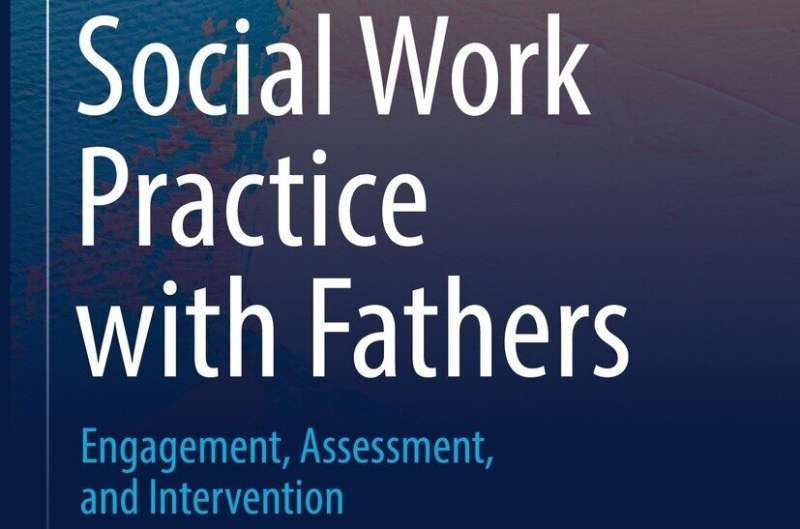This article has been reviewed according to Science X's editorial process and policies. Editors have highlighted the following attributes while ensuring the content's credibility:
fact-checked
trusted source
proofread
New textbook offers insight into better practices to engage men as fathers

Social service systems struggle to successfully engage with men as parents. A new book co-authored and co-edited by Georgia State University scholar Qiana Cryer-Coupet addresses the biases and assumptions about men and fathers that cause this struggle and seeks to help social workers better serve men as parents.
"Social Work Practice With Fathers: Engagement, Assessment, and Intervention" explores topics including father engagement, organizational father-friendly assessments, interventions with fathers and setting the course for future theory, research and practice with fathers.
Springer Publishing Company approached Cryer-Coupet and co-editors Jennifer L. Bellamy of the University of Denver, Jennifer A. Shadik of Ohio University and Brianna P. Lemmons of Baylor University, asking them to write the book after hearing their panel discussion on how fathers are discussed in social work education at the 2019 Council on Social Work Education Annual Program Meeting.
Below, Cryer-Coupet, an associate professor in the School of Social Work in the Andrew Young School of Policy Studies, offers more details on their research and findings.
Who is your audience for this book?
This text could be essential for advanced undergraduate or graduate students in social work. The main impetus behind developing a textbook is that there needs to be more father-inclusive social work literature. We've seen more articles about fathers and how to engage fathers over the last 15 years. However, no textbooks were geared toward teaching social work students about father-inclusive practice.
This text would also be perfect for practicing social workers who want to improve their practice skills. Additionally, the text complements training pieces for social workers who need continuing education to maintain their licenses.
Will you use this book in your curriculum at Georgia State?
I will use the chapters I led in the book to teach a course in the Honors College called "The Black Fatherhood Mixtape" in the coming fall semester. The class will help students understand how to interpret father-focused research and factors that need to be considered when working with or advocating on behalf of fathers.
Can you describe the chapters you led in the writing process?
The first chapter I led was Chapter 5: Engaging Fathers in Research and Evaluation. My co-author and former graduate student, Stephen M. Gibson, and I provide an overview of factors that have impacted fathers' engagement in social work research and evaluation using a historical and social-justice lens. Next, we use the "Just Practice Framework" to explore strategies for enhancing the inclusion of diverse perspectives from various fathers in research and evaluation. Finally, we highlight resources for learning more about engaging in every aspect of the research process.
The second chapter I led was Chapter 8: Framing Interventions with Fathers. My co-author, McKenzie N. Green, and I provide intervention strategies for engaging fathers across various social service settings and engagement strategies that may improve social work practice with fathers. We highlight the difference between father-focused, father-inclusive and father-friendly interventions. In addition, this chapter highlights how to frame the interventions, how to implement the interventions effectively and how to evaluate the impact of the interventions.
Were any fathers included in the creation of the textbook?
One thing you'll notice about the editors is that we are all women. We wanted to make sure we had a variety of voices. We wanted to ensure that we had men who identified as fathers contribute their perspectives. There are several chapters that are authored or co-authored by fathers. Most of the practitioners who responded to the research study that framed Chapter 8 were male practitioners, many of whom were also fathers.
Can you describe some best practices for working with fathers to ensure successful engagements with men as parents?
In my experience with the book, as well as my experience doing research and working as a social worker with fathers, one of the most important things is to approach every father as an individual, considering their humanity.
Often as social workers, we are introduced to or involved with dads because of a problem within the family system. However, it is essential to recognize that every individual has strengths that we can build upon to help them think about the best path forward for them, their family, or the community, whatever the setting may be.
Respect is paramount. Also, be open to listening to that person's story so that when you come together to develop a treatment plan, fathers feel their voice is heard and valued.
Also, I tell my students in my Human Behavior Theory courses to interrogate their biases before coming to work. As a professor, I want to ensure they are doing that work before entering the field.
Finally, it's imperative to have a strong relationship with a supervisor, mentor or peer to process the social work experience, because you don't want personal values to negatively impact engagement with clients, particularly with historically marginalized clients such as fathers.
Provided by Georgia State University




















